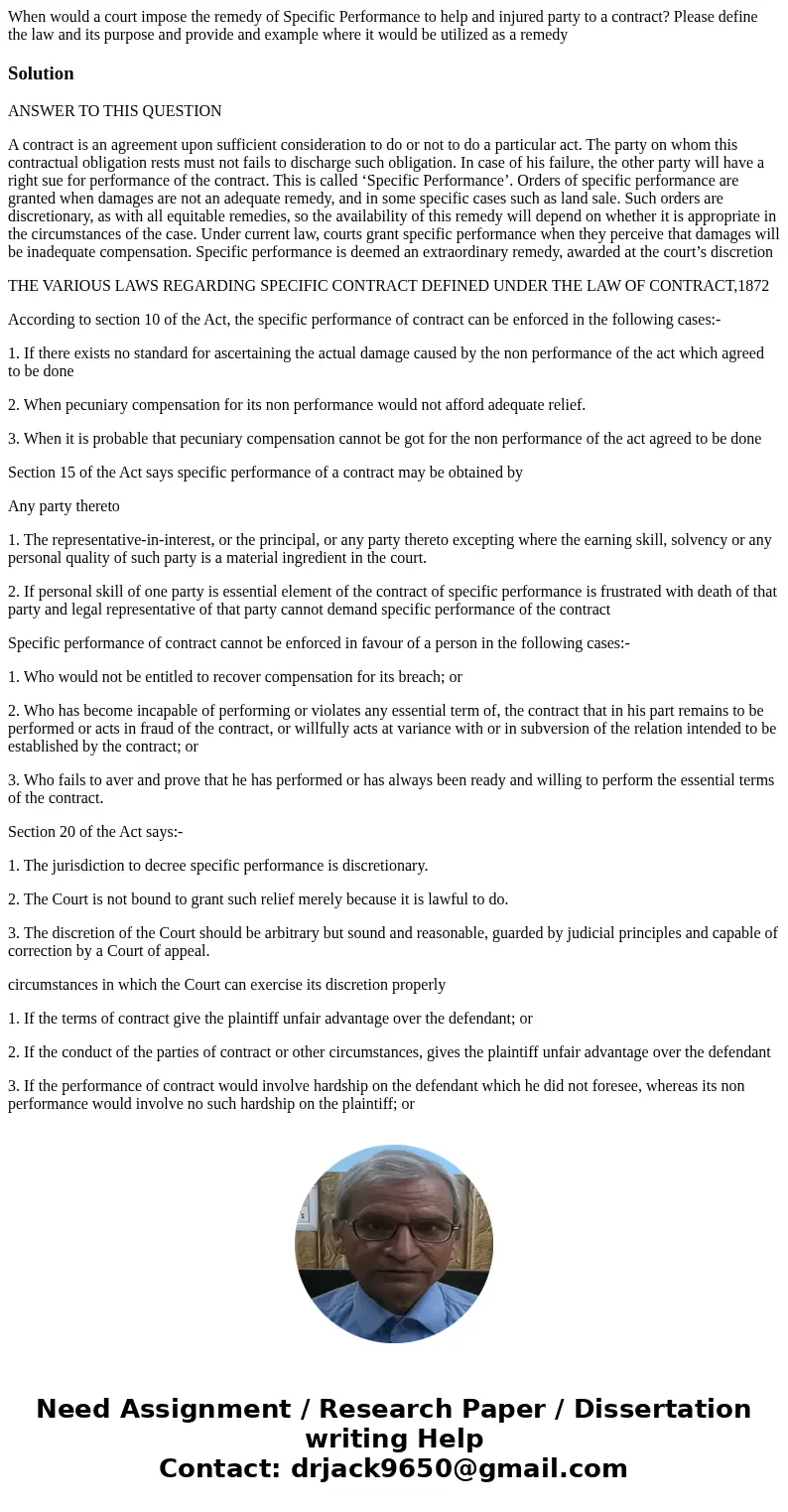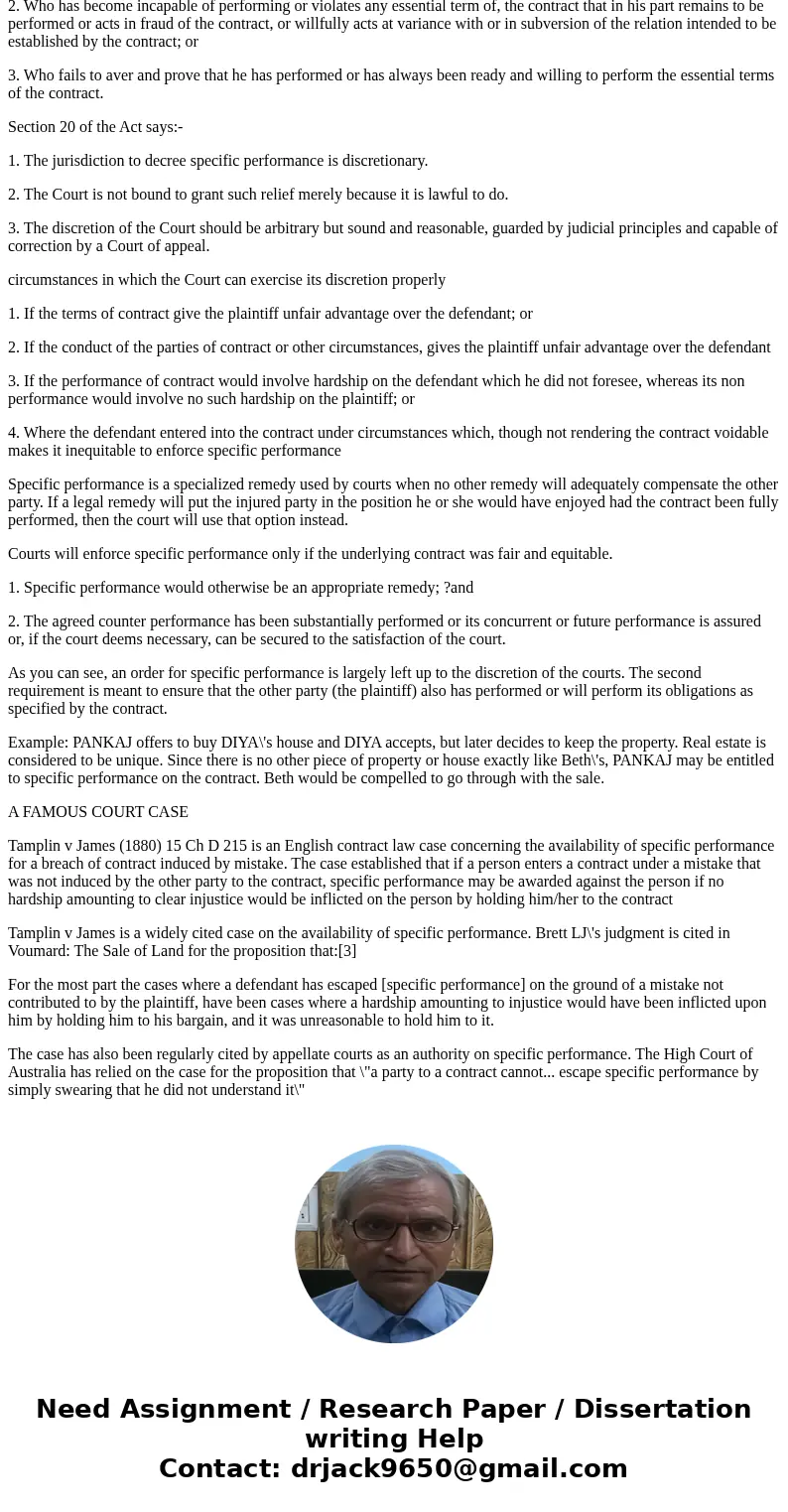When would a court impose the remedy of Specific Performance
When would a court impose the remedy of Specific Performance to help and injured party to a contract? Please define the law and its purpose and provide and example where it would be utilized as a remedy
Solution
ANSWER TO THIS QUESTION
A contract is an agreement upon sufficient consideration to do or not to do a particular act. The party on whom this contractual obligation rests must not fails to discharge such obligation. In case of his failure, the other party will have a right sue for performance of the contract. This is called ‘Specific Performance’. Orders of specific performance are granted when damages are not an adequate remedy, and in some specific cases such as land sale. Such orders are discretionary, as with all equitable remedies, so the availability of this remedy will depend on whether it is appropriate in the circumstances of the case. Under current law, courts grant specific performance when they perceive that damages will be inadequate compensation. Specific performance is deemed an extraordinary remedy, awarded at the court’s discretion
THE VARIOUS LAWS REGARDING SPECIFIC CONTRACT DEFINED UNDER THE LAW OF CONTRACT,1872
According to section 10 of the Act, the specific performance of contract can be enforced in the following cases:-
1. If there exists no standard for ascertaining the actual damage caused by the non performance of the act which agreed to be done
2. When pecuniary compensation for its non performance would not afford adequate relief.
3. When it is probable that pecuniary compensation cannot be got for the non performance of the act agreed to be done
Section 15 of the Act says specific performance of a contract may be obtained by
Any party thereto
1. The representative-in-interest, or the principal, or any party thereto excepting where the earning skill, solvency or any personal quality of such party is a material ingredient in the court.
2. If personal skill of one party is essential element of the contract of specific performance is frustrated with death of that party and legal representative of that party cannot demand specific performance of the contract
Specific performance of contract cannot be enforced in favour of a person in the following cases:-
1. Who would not be entitled to recover compensation for its breach; or
2. Who has become incapable of performing or violates any essential term of, the contract that in his part remains to be performed or acts in fraud of the contract, or willfully acts at variance with or in subversion of the relation intended to be established by the contract; or
3. Who fails to aver and prove that he has performed or has always been ready and willing to perform the essential terms of the contract.
Section 20 of the Act says:-
1. The jurisdiction to decree specific performance is discretionary.
2. The Court is not bound to grant such relief merely because it is lawful to do.
3. The discretion of the Court should be arbitrary but sound and reasonable, guarded by judicial principles and capable of correction by a Court of appeal.
circumstances in which the Court can exercise its discretion properly
1. If the terms of contract give the plaintiff unfair advantage over the defendant; or
2. If the conduct of the parties of contract or other circumstances, gives the plaintiff unfair advantage over the defendant
3. If the performance of contract would involve hardship on the defendant which he did not foresee, whereas its non performance would involve no such hardship on the plaintiff; or
4. Where the defendant entered into the contract under circumstances which, though not rendering the contract voidable makes it inequitable to enforce specific performance
Specific performance is a specialized remedy used by courts when no other remedy will adequately compensate the other party. If a legal remedy will put the injured party in the position he or she would have enjoyed had the contract been fully performed, then the court will use that option instead.
Courts will enforce specific performance only if the underlying contract was fair and equitable.
1. Specific performance would otherwise be an appropriate remedy; ?and
2. The agreed counter performance has been substantially performed or its concurrent or future performance is assured or, if the court deems necessary, can be secured to the satisfaction of the court.
As you can see, an order for specific performance is largely left up to the discretion of the courts. The second requirement is meant to ensure that the other party (the plaintiff) also has performed or will perform its obligations as specified by the contract.
Example: PANKAJ offers to buy DIYA\'s house and DIYA accepts, but later decides to keep the property. Real estate is considered to be unique. Since there is no other piece of property or house exactly like Beth\'s, PANKAJ may be entitled to specific performance on the contract. Beth would be compelled to go through with the sale.
A FAMOUS COURT CASE
Tamplin v James (1880) 15 Ch D 215 is an English contract law case concerning the availability of specific performance for a breach of contract induced by mistake. The case established that if a person enters a contract under a mistake that was not induced by the other party to the contract, specific performance may be awarded against the person if no hardship amounting to clear injustice would be inflicted on the person by holding him/her to the contract
Tamplin v James is a widely cited case on the availability of specific performance. Brett LJ\'s judgment is cited in Voumard: The Sale of Land for the proposition that:[3]
For the most part the cases where a defendant has escaped [specific performance] on the ground of a mistake not contributed to by the plaintiff, have been cases where a hardship amounting to injustice would have been inflicted upon him by holding him to his bargain, and it was unreasonable to hold him to it.
The case has also been regularly cited by appellate courts as an authority on specific performance. The High Court of Australia has relied on the case for the proposition that \"a party to a contract cannot... escape specific performance by simply swearing that he did not understand it\"


 Homework Sourse
Homework Sourse